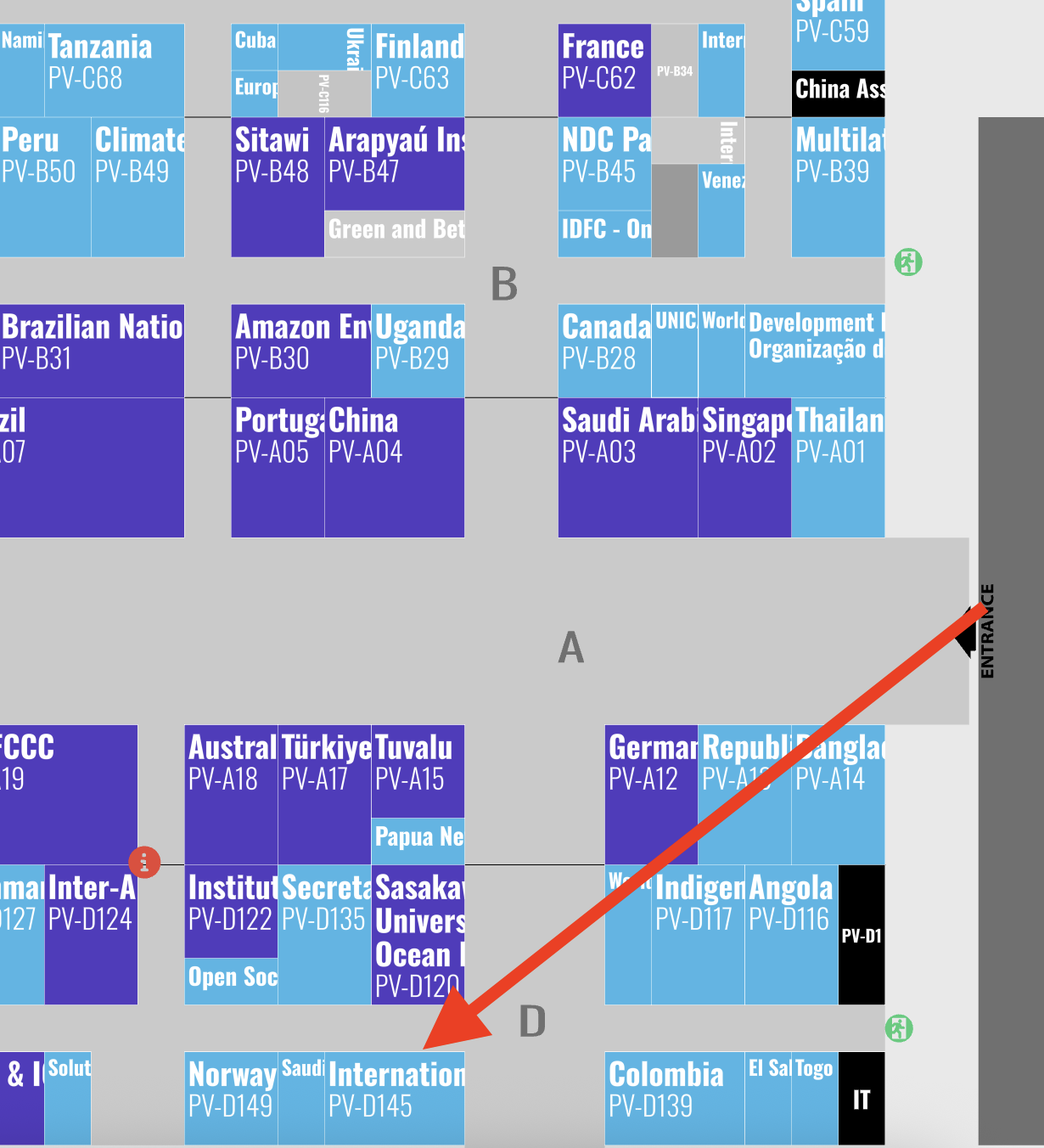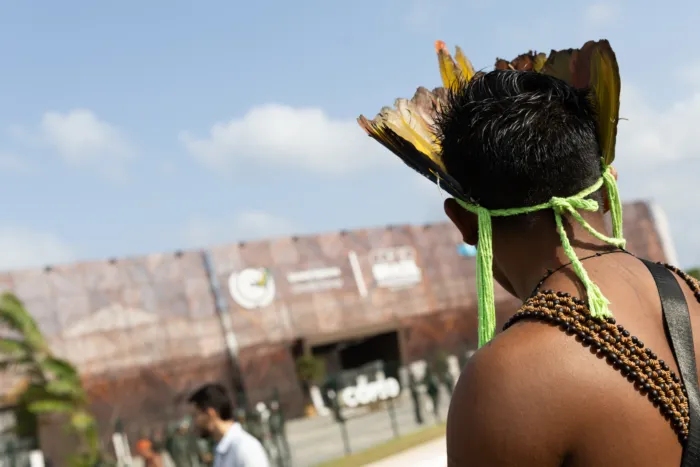
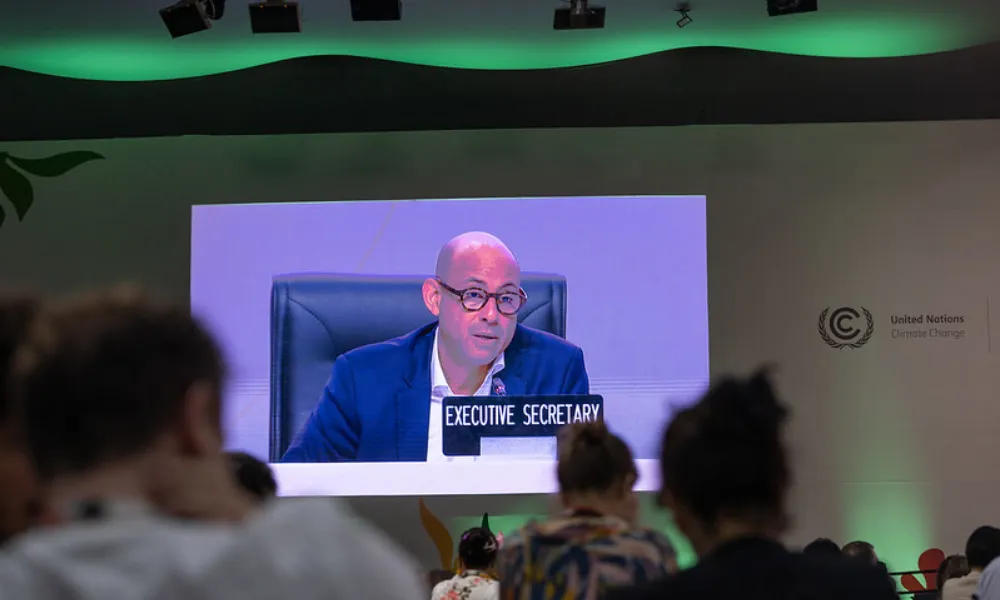
UNFCCC chief Simon Stiell closed out week 1 of COP30 by asking Parties to “give a little so [they] can get a lot.” Photo: UNFCCC
Day 6: 15 NOVEMBER 2025
(Apologies for the slight delay in getting Saturday's report to you! COP30 is taking Sunday off, giving everyone time to catch up on sleep and to absorb the first week's proceedings.)
The first week of COP ended quietly with closing plenaries of the Subsidiary Bodies and an interim plenary of COP/CMP/CMA. The sessions had few surprises but left a lot of work waiting for ministers who'll be arriving shortly to take up political questions next week.
At the top of the COP30 agenda, discussions over the four supplementary items that were tabled at the start of COP30 – Article 9.1 (financial help from developed to developing countries), unilateral trade measures, responding to the latest Nationally Determined Contributions and biennial transparency reviews – will continue to be led by the COP Presidency, who'll have to decide how these discussions can be reflected in COP30 outcomes.
COP president André Corrêa do Lago said the UNFCCC will publish summaries of the discussions on Sunday.
The Subsidiary Bodies concluded their work at an overlapping plenary on Saturday, with a large number of agenda items failing to find consensus. Numerous agenda items were forwarded to ministers with cover notes highlighting a lack of consensus – which is typical for the end of week 1.
The SBSTA portion of the session was notable for numerous complaints about the agenda item on research and systematic observation; Parties complained at the SBSTA's inability to adopt the latest scientific findings on the progress of climate change, with several speaking of "attacks" on the IPCC despite its widely accepted status as the best available science. Saudi Arabia and Iran, on the other hand, both complained at a lack of funding for observation and research in developing countries.
Draft joint SB text on the Global Goal on Adaptation was also forwarded to CMA as a "proposal by the Chairs of the subsidiary bodies, under their responsibility, which includes divergent views, has not been agreed upon, does not reflect consensus, is not exhaustive, has no formal status, is open to revision and does not prejudge further work or prevent Parties from expressing any further views."
President do Lago appointed ministerial pairs to take up outstanding agenda items:
- Global Stocktake (GST): Andreas Bjelland Eriksen (Norway) and another minister to be confirmed;
- Global Goal on Adaptation: Rohey John Manjang (The Gambia), and Jochen Flasbarth (Germany);
- Finance: Ed Miliband (UK) and Deborah Mlongo Barasa (Kenya);
- Mitigation: Sara Aagesen (Spain) and Wael Aboulmagd (Egypt);
- Just Transition: Alicia Bárcena (Mexico) and Krzysztof Bolesta (Poland);
- Technology: Chris Bowen (Australia) and Bhupender Yadav (India); and
- Gender: Maisa Rojas (Chile) and Helena Dyrssen (Sweden).
These ministers will report back to the Presidency early next week, after which a “mutirão” at ministerial and heads of delegation level will convene. UNFCCC executive secretary Simon Stiell encouraged Parties to “find each other in the hallways” and to “give a little so [they] can get a lot.”
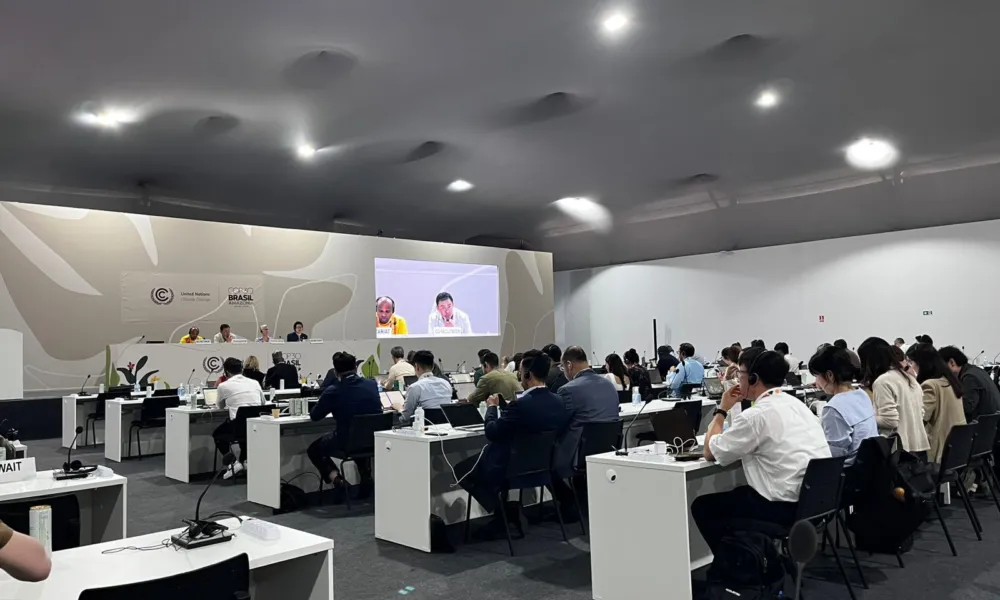
Negotiations over the annual report of the Article 6.4 SBM continued on Saturday. Source: IETA
In the negotiations
There were no meetings and no new texts concerning Article 6.2 on Saturday, though a new text was published late on Saturday evening.
On Saturday, negotiators held a third informal consultation on the Article 6.4 Supervisory Body's annual report, after which an updated version of the draft text was published late on Saturday.
Our observers noted there was broad support among Parties for not revising the standards already adopted by the SBM, and that adding further guidance in the draft decision would begin to micro-manage the SB rather than enable it.
Regarding linkages between NDCs and the 6.4 mechanism, China, the Arab Group, Turkiye, South Africa and the AILAC, LMDC, LDC and CfRN groups (among others) expressed opposition to section VII of the text or any prescriptive language linking the use of the 6.4 mechanism to NDCs, recalling that NDCs are nationally determined and there is no mandate to negotiate that linkage.
The EU, UK, LDCs, and Switzerland indicated they could accept softer language, such as merely encouraging or inviting Parties to consider using the mechanism, which is closer to the original SBM wording.
On the issue of a voluntary cancellation facility, in Section VIII of the draft, AOSIS, Switzerland, EU, New Zealand, the UK and others questioned the references to a voluntary cancellation facility, noting that the SBM has not discussed this concept, it does not form part of the report, and that no units are available yet. Many others called for this to be deleted from the draft decision.
Several Parties (New Zealand, the UK, Peru and the LDC, LMDC and CfRN) were open to exploring the idea in the future, but stressed that this COP is not the right moment and that, if anything, it should be framed as future work, not as something already established.
On term limits, the initial proposal from the SBM itself had been for a single two-year break after a second term after which no term limits would apply.
New Zealand, Singapore, South Africa the LMDC, LDC, CfRN and others supported revisiting SBM members’ terms now and proposed a compromise of a mandatory two-year break after each two-term spell. Others, such as the EU, the UK and Canada preferred to wait until the 2028 review to address term limits.
On the Methodological Experts Panel, New Zealand stressed that MEP members should not be subject to the same term-limit logic as SBM members, since they are deep technical experts selected on the basis of their CVs and paid for that work. Switzerland noted that MEP rotation is a delicate issue and linked to discussions already foreseen for the SBM in early 2026.
On forests, land sector, and nature-based solutions (in paragraphs 24 and 25), the CfRN strongly opposed what they called an “obsessive” focus on forests, calling for priority to be placed on major emission sources such as the energy sector.
There was broad unease with paragraphs highlighting nature-based solutions and REDD+: the EU, Canada, Qatar, Switzerland, CfRN, and others requested to delete or significantly soften these paragraphs or to avoid emphasising a single sector or activity in the guidance.
CfRN and others also questioned the terminology around “jurisdictional” approaches and “biogenic reservoirs”, asking for clarification or deletion.
Regarding the text on transparency, stakeholder engagement and accountability, the EU, Switzerland and Russia underlined that the 6.4 Supervisory Body is already one of the most transparent bodies (webcasts, detailed procedures) but agreed that consultation processes and timelines can be improved, including clearer communication on consultation windows (Switzerland).
CfRN and the EU criticised that workshops and consultations tend to privilege well-resourced and well-financed stakeholders, calling for more equitable participation.
The Article 6.8 discussions in week one produced an "elements of a draft decision" text that is entirely bracketed, which observers say was a reflection of ongoing discussions in the Article 6.4 stream concerning the treatment of nature-based activities. Media quoted insiders saying that 6.8 is being "held hostage".
The 'elements' were accompanied by draft decisions from the chair of SBSTA, which noted that elements of the Article 6.8 draft decision "do not represent consensus among Parties and that further work by the CMA is necessary to finalise the decision."
There were also some updates made to the draft text on guidance to the clean development mechanism; mainly consisting of new alternative deadlines for cessation of CDM activities, including:
- for requests for issuance: 30 June 2026, 31 December 2026 or 31 December 2027;
- for requests for transfer of CERs to the Article 6.4 registry: 31 December 2026, 30 June 2027 or 30 June 2028;
- for cancellation of CERs: 31 December 2026, 30 June 2027 or 30 June 2028, and
- for post-registration changes: 30 June 2026, 31 December 2026 or 31 December 2027.
Parties including the African Group, LDCs, South Africa, Peru, Norway and the UK, were open to extending the transition deadline to 2026, but the EU and Switzerland are reluctant to grant additional time.
Pedro Martins Barata, who many of you know was for many years a negotiator for the EU and a member of the CDM Executive Board, weighed in on the issue of SBM term limits in a post on LinkedIn that we thought worth sharing.
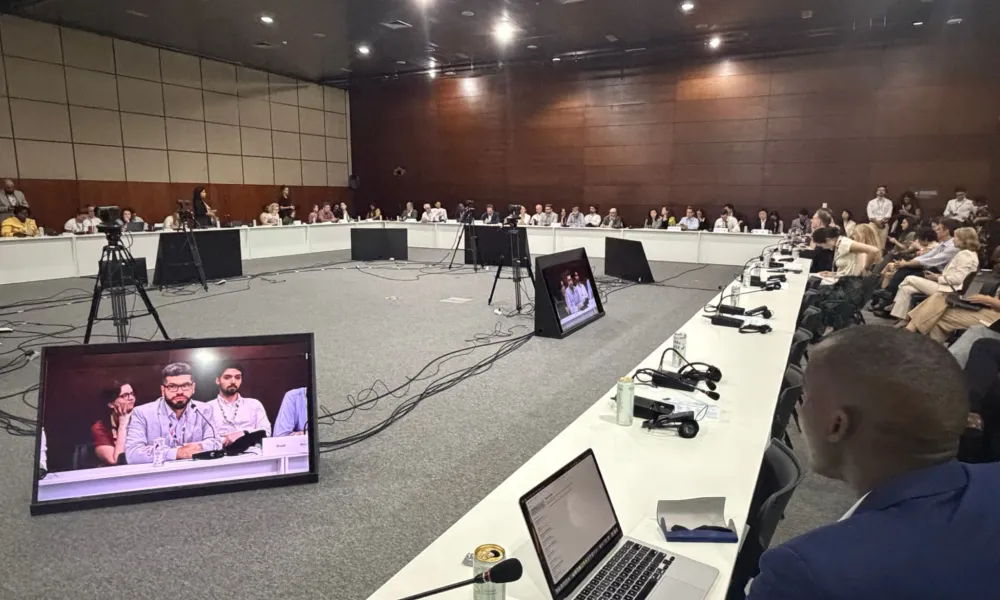
Brazil held a ministerial roundtable to launch its Open Coalition on Compliance Carbon Markets, a collaborative initiative aimed at fostering mutual understanding of compliance carbon markets and carbon pricing mechanisms. Photo: IETA
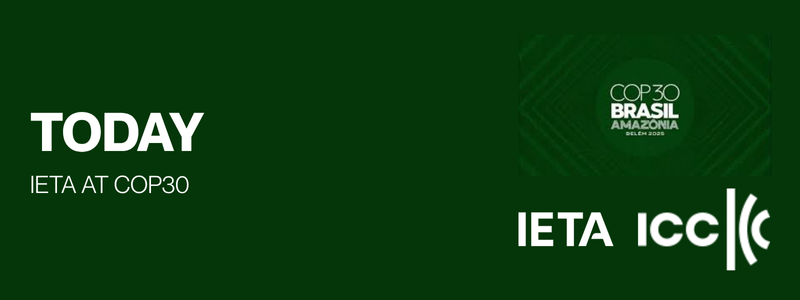
Policy advisor Mariana Tavares joined a session hosted by the International Union of Railways to deliver a briefing on the emerging opportunities for Brazil’s rail sector to leverage carbon markets under Article 6. She outlined how the transport sector — responsible for 43% of Brazil’s energy-related CO2 — faces high costs due to the country’s heavy dependence on road freight, and highlighted the national goal of raising rail’s modal share from 17.7% to 34.6%.
Mariana emphasised the proven emissions and cost benefits of rail projects, referencing recent reductions achieved in Rio and São Paulo, and underscored how Article 6 can unlock significant finance through higher-value ITMOs. She also detailed Brazil’s new SBCE framework and the potential for Brazilian cooperation modelled after successful international bilateral agreements.
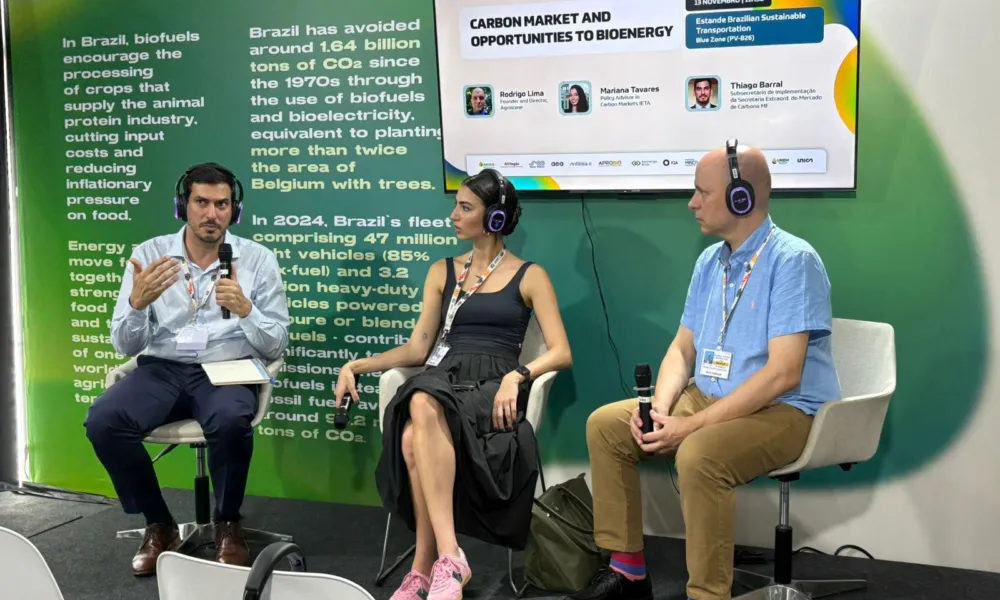
Pedro Venzon represented IETA at two side events on Saturday. First, on a panel discussion on the integration of civil aviation into Brazil's forthcoming carbon market organised by LATAM at the Brazilian Industry Pavilion, Pedro emphasised the importance of aligning the Brazilian system with best practicers in international carbon markets, ensuring coherence with sectoral policies such as the Plano Clima, the Sustainable Taxonomy and ProBioQAV to support a credible decarbonisation pathway for aviation.
In the afternoon he also joined a roundtable on decarbonisation strategies for hard-to-abate sectors, where he highlighted emerging technological solutions, the critical role of clear regulation, access to finance and international cooperation through Article 6, and stressed that private-sector leadership—through concrete commitments, value-chain engagement and coordinated global action—will be essential for scaling decarbonisation and positioning Brazil as a competitive hub for low-carbon industrial transformation.
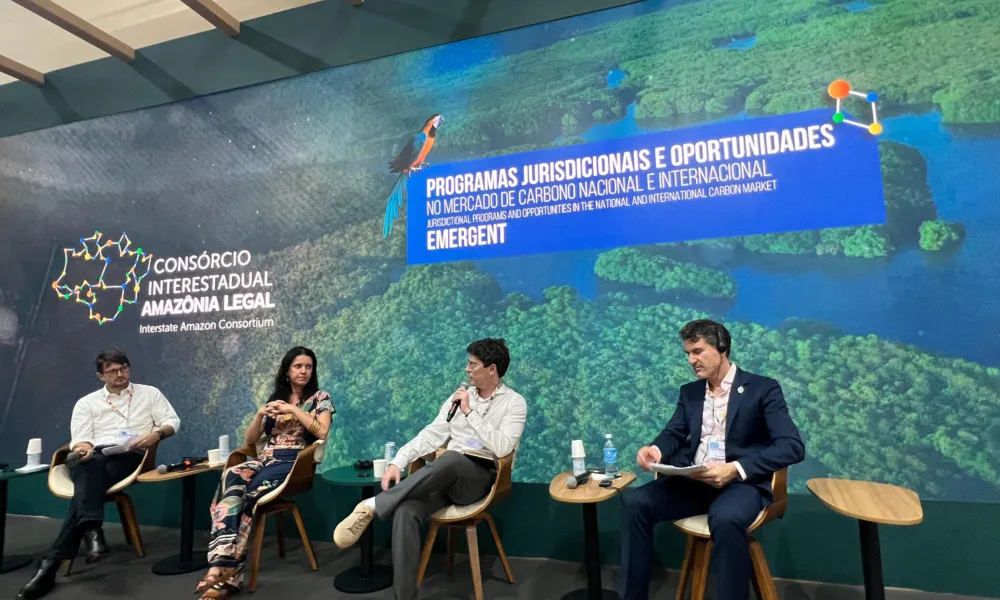
And Agustina Cundari participated in the Article 6 Implementation Partnership's General Assembly. Speakers welcomed that from a business perspective, COP30 is where Article 6 has finally moved from rule-making to implementation, but they noted that real market activity is still far behind.
We've already seen more than 70 bilateral agreements and over 25 JCM agreements on Article 6 cooperation, but only four ITMO transactions have actually taken place so far – despite 17 Initial Reports and the first rounds of Annual Information and Technical Expert Reviews under Article 6.2
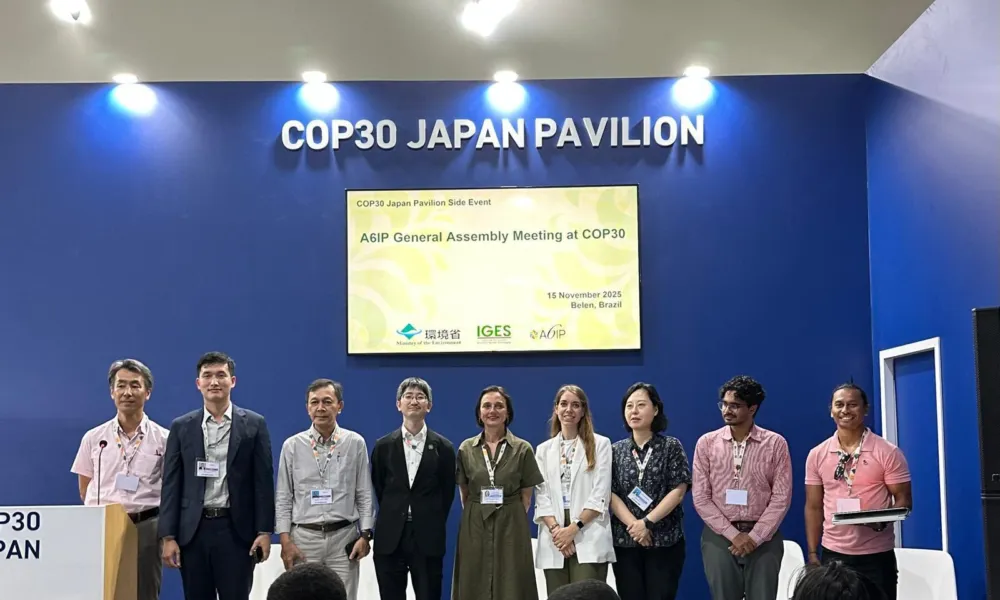

All event times are listed in Brasilia time (BRT), which is three hours behind GMT and 11 hours behind Singapore time.
The IETA/ICC Business Hub is located in Pavilion D145 (see image below). It's in area D of the Delegation Pavilions hall, quite close to the main entrance, and our neighbours are Colombia, the World Meteorological Organisation, Saudi Green Buildings Forum and the Oceans pavilion.
IETA has two side event venues within the Hub: the Boardroom and the Side Event Theatre. You can find the IETA schedule of events here, while the UNFCCC has produced an online schedule of side events here.
Week 2 of our COP side event programme starts on Monday at 0800 BRT. The Climate Resourcing Coordination Centre, BioCarbon Standard and Allen Manza will host a breakfast roundtable to discuss Pakistan’s climate investment pipeline and carbon markets. Javier Manzanares, BioCarbon's chairman, will showcase Pakistan’s national climate financing ecosystem, connecting the CRCC’s programmes on adaptation, mitigation, and carbon removal with international financiers, technical partners, and carbon market actors.
At 1100 BRT ALMA Brasil will host a review of Pará state’s experience in developing an efficient roadmap for nesting REDD+ projects into jurisdictional programmes. It will explore how other jurisdictions can or are already adopting similar approaches, strengthening carbon market integrity and channeling finance to effectively combat deforestation. Speakers from Petrobras, the government of Pará, The Nature Conservancy, the Consortium of Amazon States, IPAM, Wildlife Works, Peru's Ministry of Environment and the government of Argentina's Misiones province will participate.
Elsewhere on Monday, at 1130 BRT in Side Event Room 5, GIZ, ClimateNet and ICD will host a discussion on how high-integrity carbon markets can foster climate ambition by incentivising carbon removals. Participants will include the European Commission, KfW Development Bank, Perspectives Climate Research, GIZ, Negative Emissions Platform, and private sector stakeholders such as Great Carbon Valley, as well as government representatives from Brazil, Colombia and Kenya.
Bhutan will host a session showcasing its progress in building a high-integrity carbon market: from the Bhutan Carbon Market Rules and National Carbon Registry to the country's first Article 6.2 agreement with Singapore. The session will feature a list of potential mitigation projects across sectors such as forestry, energy, waste, and transport, showcasing opportunities for developers, investors, and partners to engage in Bhutan’s evolving carbon market ecosystem. Join Bhutan on Monday November 17 at 1200 BRT in the WGEO Pavilion.
Lastly, at 1315 BRT in Side Event Room 6, the Making Finance Work for Climate Coalition — representing 40% of global financial assets and 500+ public development banks in developed and emerging markets — will hold a discussion on scaling up quantity and quality of climate finance for emerging markets and developing economies.
